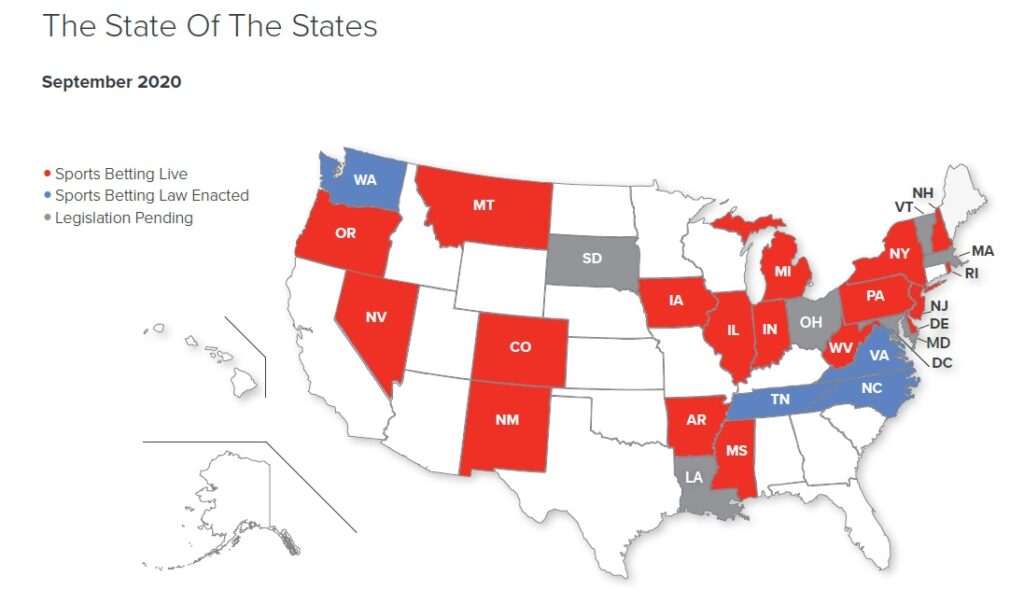Online sports betting and other forms of wagering have been restricted for some time, with the Professional and Amateur Sports Protection Act of 1992 preventing fans from placing bets on games. Some exemptions existed, but this mostly only favored Nevada and a few other states.
Current Online Sports Betting Situation in the USA Right now, full-on sports betting is available legally in Nevada, Delaware, New Jersey, West Virginia, Mississippi, New Mexico, and more states (see our map above to check your home state). When discussing legal online sports betting, the majority of America's government has a very regressive, prohibition-style attitude towards it, buying into a negative perspective concerning the morality of gambling entertainment. This is what has led to a variety of state gambling laws in the past.

- Feb 10, 2020 Until the State explicitly makes online gambling (in any form) legal, it is illegal. It is difficult to speculate whether or not the law is strictly enforced. RANK: Patently Illegal. Regulated online gambling is legal in Delaware, and nothing in that bill would tend to make it appear illegal to play at unregulated sites.
- Iowa, Nevada, New Jersey, Oregon, Pennsylvania, Rhode Island, and West Virginia currently permit state-regulated online sports gambling, with nearly two dozen additional states having launched land-based sportsbooks.
In 2018, the US Supreme Court ruled that this law was unconstitutional, paving the way for states to set their own rules on sports books. This means that, unlike many European countries, where laws are uniform across the territory, Americans living just a few miles from each other may be subject to very different laws on betting.
American States Where Online Sports Betting is Legal
Nevada and New Jersey were some of the first to take advantage of this, passing legislation almost immediately. As of July 2020, there are 12 states that allow online sports betting in the country, although they each have different rules.
New Jersey
New Jersey offers the widest range of online sports betting with around 17 different licensed sports books. Online casinos are also legal, meaning New Jersey-ites can enjoy new slot games in 2020 as well as betting on a wide array of sports.
Nevada

Online sports betting is possible in Nevada, but you must first create your account while inside a physical casino first.
Indiana
Sports betting websites have been operating since 2019, with a broad selection of bookmakers to choose from. Users can sign up, deposit and place wagers from their computer or mobile device, but there are some restrictions on in-game betting.
Pennsylvania
Most major online bookmakers operate in Pennsylvania where online wagering has been allowed since 2019. The state is a big market since it has one of the biggest populations in the country and a high proportion of sports fans.
Colorado
First allowed in May 2020, sports fans in Colorado already have a good selection of sports books to choose from. It also has some of the most liberal rules surrounding sports betting, with online registration and depositing, no in-game restrictions and wagers on college teams allowed.
Illinois
Illinois passed legislation that allowed online sports betting in June 2019 but the first brands didn’t begin accepting registrations until Q1 of 2020. Existing physical casinos in the state have an 18-month head start over national online brands.
Iowa
After sports betting was permitted in May 2019, several sports books have begun operating in the state. However, until 2021 fans must visit a sports book or casino in-person to create their account.
Mississippi
Mississippi first legalized sports betting in 2018, but it requires bets to be placed inside a casino, even if the customer wants to use their smartphone.
New Hampshire
New Hampshire has allowed sports betting since July 2019 although wagering from a smartphone wasn’t permitted for another 5 months. Only a handful of brands operate in the state right now, but more are expected to open soon.
Oregon
Sports betting is allowed in Oregon but only through the state-operated Oregon Lottery.
Rhode Island
Rhode Island is the only state to allow betting at 18 instead of 21. However, like Oregon, it’s only permitted through the state lottery.
West Virginia
Sports betting in West Virginia has been legal since August 2019, with full online and mobile services allowed.
Which Will be the 13th State?
While there are still 38 states that don’t allow sports betting, it is expected that many more will pass legislation that will change this in the coming months and years. Some of these are expected to do so much quicker than others, including:
- Kentucky – A bill to legalize sports betting was blocked earlier in 2020, but commentators believe this to only be a temporary hurdle
- Ohio – In May 2020, the Ohio House Finance Committee voted to progress a bill that will legalize sports betting in the state. It was approved by the House the next day but still needs to be approved by the Senate.
- Connecticut – Like Kentucky, a bill had been progressing in early 2020 but it has been hit many hurdles.
- Maryland – A bill was approved by the Senate in early March 2020 but it’s not yet clear when it will be approved by the House.
- Missouri – The state of Missouri has been considering sports betting for some time, but there have been delays for it and other matters in recent months, meaning it’s not yet clear when it will pass.
Of these five, either Ohio or Maryland is likely to be the first to permit betting but these could still be derailed.
With New York facing a $15 billion budget shortfall from the coronavirus pandemic, online sports betting is viewed as one possible way to inject much-needed money into the state. New Jersey legalized online wagers in 2018, and earlier this month, Governor Andrew Cuomo included an online professional sports betting plan in his executive budget proposal that he claimed would raise $500 million in revenue for the state.
But many logistical hurdles remain. Cuomo’s proposal for legalization runs counter to what the Democratic supermajority in the state legislature is pitching. Some authorities are questioning the legality of the whole enterprise. And there are lingering concerns about gambling and addiction, particularly with the number of people sequestered at home and the opportunities that could be suddenly available to lose significant amounts of cash.
“I don’t see the governor’s proposal as workable in New York,” said Assemblyman Gary Pretlow, the chairman of the Committee on Racing and Wagering.
Right now, you can place horse racing bets on your smartphone through an app run by the not-for-profit corporation that oversees horse racing in New York’s three major tracks. Mobile betting for professional sports could theoretically function in a similar way. Currently, the servers for horse betting are located at the racetracks.
In both Cuomo and the legislature's proposals, the servers for mobile sports betting would be situated at places where bets are already taken, like casinos. The major overriding question is how many operators, or “skins,” as they are called in the industry, there will be, and who will get to profit.
Under Cuomo’s proposal, which still needs to be fleshed out further, the New York State Gaming Commission would be directed to solicit bids for a small number of mobile sports wagering operators. The system would be akin to how the state-run lottery functions, with possibly only one or a small number of operators overseeing sports betting. A single operator runs online sports betting in New Hampshire, Oregon, Rhode Island and the District of Columbia. Overall, sports betting is now legal in more than two dozen states.
Robert Mujica, Cuomo’s budget director, said earlier this month that the advantage of the state proposal would be the ability to maximize tax revenue. “The fundamental question is: if you want to support the bottom line for casinos or New York’s students. And the governor’s proposal chooses students,” Mujica told the Wall Street Journal. (An identical statement was sent to Gothamist from Freeman Klopott, a budget spokesman for Cuomo.)

It’s not clear yet what Cuomo’s tax rate would be for his online betting model, though Mujica has asserted that it would be enough to raise $500 million a year. The state legislative proposal, co-sponsored by Pretlow and the chairman of the State Senate’s Racing and Wagering Committee, Joseph Addabbo, puts the number closer to $100 million annually.
At first glance, that would seem to make Cuomo’s proposal the better one, given the potential for serious state budget cuts without new forms of revenue. But lawmakers and some gambling industry insiders aren’t so sure. In New Jersey, which is generally viewed as a success given the number of people who place bets, there are as many as 17 legal online sportsbooks.
New York’s legislature is looking to take a similar approach, believing their proposal has a better opportunity for growth—more operators can lead to more options for consumers and more interest in placing bets. Addabbo calls his legislation “inclusive,” because it would also allow for Native American casinos, casinos on state property, and off-track betting sites to participate.
“Competition bodes better for our residents and will drive up revenues than being a narrow state-run lottery kind of system,” Addabbo argued. “New York finds itself in a very odd position not being a leader. We are outside looking in. New York right now is a three-wheeled car limping along in the right lane. New Jersey and Pennsylvania are speeding by us.”
Is Online Sports Betting Legal
Bennett Liebman is a government lawyer in residence at Albany Law School who previously advised Cuomo as the deputy secretary for Gaming and Racing. He said the difference between the two models is a question of what is being prioritized: more tax revenue, or a better model, long-term, for consumers and gambling interests?
“It all depends on what you want in your market. If you want what the governor is seeking, which the draft is very general, you are looking for maximum tax revenue, you will give it to one or two groups and you are going to tax them at a very high rate,” Liebman said. “If you are looking to create a robust market to help out casinos and consumers, then you go with, or you are more inclined to go with, the legislative plan.”
Liebman called the Cuomo administration’s $500 million revenue figure for online sports betting “very, very high,” and predicted a few operators would dominate the space in New York, like DraftKings and FanDuel have done in New Jersey. Casinos, racetracks, and online gambling in total generated a little more than $300 million in tax revenue for New Jersey in 2020.
States Allowing Sports Betting
Even if New York reached Cuomo’s projections—let alone the far smaller figure from the state legislature—online sports betting would represent only a minuscule fraction of a state budget that was $177 billion last year. One question hanging over the debate is whether the united front fighting for mobile sports betting in New York—the currently existing casinos, and operators like DraftKings and FanDuel—would crumble if only a small number of them were selected to make money from sports betting.
According to a constitutional amendment passed in 2013, sports wagering in New York is currently allowed only in physical portions of its four existing commercial casinos and other facilities operated by Indian tribes. Cuomo and supporters of online sports betting believe their proposal will meet the requirements of the state constitution by locating the servers for the betting websites at the physical casinos.
Neil Murray, an Albany attorney who has sued to oppose gambling in the state, said there was a “legitimate, serious question” about the constitutionality of online sports betting.
“The problem right now is the constitutional amendment that was passed several years ago does carve out exceptions for gambling at casinos. The operative word is ‘at’ and what does that mean?”
Online Sports Betting Legal States List
Murray argued the way the amendment was proposed—an economic stimulus for destination casinos that would prevent the proliferation of gambling statewide—contradicts the arguments made for mobile sports betting today. “If you allow online gambling and people can gamble from their living rooms, then of course that destroys the whole purpose on which gambling was authorized on a limited basis to begin with,” he said. “Everybody is counting on collective amnesia.”
Pretlow, the state assemblyman, contended that his bill met the requirements of the state constitution but Cuomo’s would not if it chose to operate like the state lottery. The lottery is regarded as a game of pure chance with no skill involved, allowing it to circumvent a longtime prohibition on gambling in the state.
“The lottery has to be 100 percent chance. The lottery is not gambling,” Pretlow said. “It’s flip a coin, heads or tails, nothing in the middle. I think if the lottery were to handle sports betting, it would lead to a constitutional question.”
NYC news never sleeps. Get the Gothamist Daily newsletter and don't miss a moment.
Do you know the scoop?Comment below or Send us a Tip